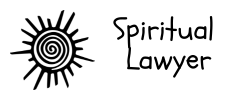There were a lot of concepts and beliefs in the faith that I was brought up in that did not sit well with me. So at the age of twelve, I stopped going to church. My desire for spirituality was still there though. So what do you do?
I started exploring different religions, such as buddhism, and without giving it much thought, I started to pick and choose what felt right for me and what didn’t. Now that I have been on this path for well over thirty years, I would like to invite you to do the same, regardless of whether you decide to stay in your religious tradition or not, as some of you value the communities that these religions have built and want to stay.
I am officially giving you permission to create your own spiritual blueprint. Especially if you are a woman or a member of the LGBT community because traditionally, religions have not treated our communities well, so it’s up to us to create a new narrative. Before we dive in, I also want you to go through this exercise with cultural appropriation in mind so that you remain respectful of other people’s cultures and religions, especially if they have been exploited or are marginalised. You can read more about what cultural appropriation is in this Wikipedia article.
With this caveat, let’s dive in. I have selected three concepts from the PDF that I created to help you with this process, namely, heaven and hell, angels and karma. The PDF, that you will receive is you sign up for my newsletter with this link, has five pages of key words for you to explore.
- Heaven and Hell
Heaven is traditionally regarded as the place where God and the angels reside and where the good go after death, and often depicted as above the clouds. Hell on the other hand is regarded as the place where the Devil and demons reside and where the wicked go after death and often depicted with perpetual fire and darkness.
Heaven and Hell rest on the dualistic model of good and bad. Personally, I think that good and bad are always relative as they can depend on our beliefs, our culture and our circumstances. It also rest on a model where people are judged. And if you have been raised in the Catholic faith as I am, you only get one chance.
When faced with a spiritual or religious concept, I want you to get into the habit of asking yourself: Does this support the life that I am creating? And if it doesn’t, challenge it and replace it by something that feels better. You can use the four question process that Byron Katie has created, which is incredibly powerful. I describe the four questions in the episode but the most important one is number three which asks you to find out how that concept makes you feel. Personally that concept make me feel manipulated, as if I could not decide for myself what is right and what is right and I had to have the threat of hell to behave myself. Is heaven real? Who knows. Is hell real? Same answer.
What better belief can we replace them with? Personally I believe there is a material world populated with beings with bodies, humnan or animal, and a spirit world for beings without bodies. I believe that God lives in my heart (although I rarely use the word God because it has a connotation that makes me cringe). I don’t believe in heaven and hell.
2. Angels
Does the concept of angels resonate with you? The definition of angels is spiritual beings believed to be messengers of God. Do we need to believe in God to believe in angels? I personally don’t think so. For the record, I want to mention that religions have created hierarchy of angels that reflect the religious hierarchy and one has to wonder why, if not to support the oppressive religious model created by (mostly white) men. My own measuring stick for angelic presence is simplicity. So an angelic hierarchy feels like an oxymoron. You might also be interested in reading a piece I wrote for The Taoist Online on Medium recently that claims that guardian angels do not exist.
3. Karma
Although traditionally linked to Hinduism and Buddhism, karma has found its way in popular culture in the West, so I wanted to include it in this episode. It is the idea of a chain of cause and effect in morality. The most common example of karma I have heard being used is someone being ill because they did something wrong in a past life.
This ties into the concept of good and bad, with the added dimension of reincarnation, although it is not a necessary piece. I personally found it liberating when I came across it for the first time in my twenties. I had been raised by a very judgmental mother and tended to get very upset when people did the wrong thing. Of course, at the time, I could see no fault in my own behaviour but that’s a topic for another discussion. The idea that karma took care of it all was freeing at first.
Not anymore. And that’s another point I would like to make: Your blueprint is a living document. It might look a certain way today and be entirely different in a year’s time, so revisit it regularly.
To listen to the episode, click here. To share your piece of art regarding your new blueprint, DM me on my Facebook profile or my LinkedIn profile. To discuss this episode, head over to my FB page where you will find a post for this particular episode.

